TODAY’S READING FROM THE OLD TESTAMENT- 2 KINGS 17:1-18:12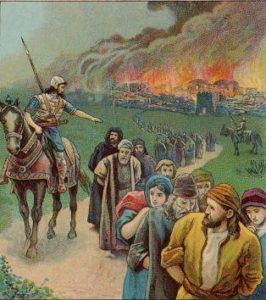
Today’s reading marks the last reading from the first half of the year and the Old Testament portion focuses on the sad event in which the northern kingdom is thoroughly defeated by the invading armies of the Assyrian King Shalmaneser.
The King of Israel, Hoshea, is seized and imprisoned, and in the ninth year of his reign, the capital city of Samaria is captured. Most of the Israelites throughout the northern kingdom are deported to Assyria and their population replaced by Gentile foreigners.
The many warnings from the prophets and God’s previous chastisements for their wickedness were disregarded. Israel had turned away from the God who delivered them from Egypt and were now serving other gods. They did not even recognize they had brought these troubles upon themselves through their own disobedience to God’s Word. The Assyrian captivity of the northern kingdom of Israel, and the Babylonian captivity of the southern kingdom of Judah, which would happen approximately 140 years later, would be the fulfillment of God’s promise given through Moses:
Deuteronomy 30:16-18 16 … I command you today to love the LORD your God, to walk in His ways and to keep His commandments and His statutes and His judgments, that you may live and multiply, and that the LORD your God may bless you in the land where you are entering to possess it. 17 “But if your heart turns away and you will not obey, but are drawn away and worship other gods and serve them, 18 I declare to you today that you shall surely perish. You will not prolong your days in the land where you are crossing the Jordan to enter and possess it.
Deuteronomy 28:36-37 36 “The LORD will bring you and your king, whom you set over you, to a nation which neither you nor your fathers have known, and there you shall serve other gods, wood and stone. 37 “You shall become a horror, a proverb, and a taunt among all the people where the LORD drives you.
The NIV translation of 2 Kings 17:15 is a description of Israel’s folly and serves as a warning for us today:
2 Kings 17:15 15 They rejected his decrees and the covenant he had made with their fathers and the warnings he had given them. They followed worthless idols and themselves became worthless. They imitated the nations around them although the LORD had ordered them, “Do not do as they do,” and they did the things the LORD had forbidden them to do.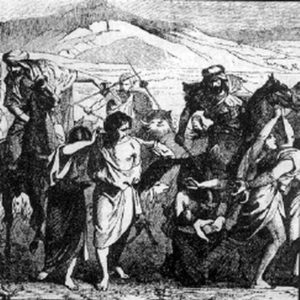
Verses 16-17 describes the despicable practices that accompanied their idolatries.
What practices accompany the idolatries in our culture today?
Unlike the Babylonian captivity of the people of Judah, the ten tribes that went into captivity were never given permission to return, this is why in their dispersion they are often referred to as ‘the ten lost tribes of Israel’.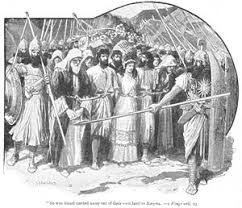
The King of Assyria brought Gentiles from Babylon, Cuthah, Avva, Hamath and Sepharvim to replace the Israelites in Samaria. But they soon felt the displeasure of the God of the Israelites and reported it to the King of Assyria who ordered some of the Israeli priests to help them cope. (You will remember that the priests of the northern kingdom were self-appointed and not Levites.) The result was an eclectic mixture of religions coexisting as one great heresy that remained in Samaria even till Jesus’ day. This is why the Jews (religious leaders of Judah) did not want to have anything to do with the Samaritans. (Remember the account of Jesus with the woman at the well in Samaria? See John 4:9)
The writer gives us a list of the false gods that were worshiped in the northern kingdom. Each tribe made its own shrines to their gods, who are listed in verses 29-31.
Notice the little bit of the real thing (worship of the Lord) that kept them from the real thing. These were false believers who might even have called themselves Jews.
2 Kings 17:32-33 32 They worshiped the LORD, but they also appointed all sorts of their own people to officiate for them as priests in the shrines at the high places. 33 They worshiped the LORD, but they also served their own gods in accordance with the customs of the nations from which they had been brought.
Chapter 17 concludes with this summary statement:
2 Kings 17:41 41 Even while these people were worshiping the LORD, they were serving their idols. To this day their children and grandchildren continue to do as their fathers did.
We have a refreshing contrast to the defeat of the Israelites of the north with the healthy reformation that goes on in the southern kingdom of Judah. Hezekiah becomes king in the third year of Israel’s final king, Hoshea.
King Hezekiah “did what was right in the eyes of the Lord” and did what previous kings failed to do- he removed the pagan idols and even the idols that the Jews had made of things that God had done in the past.
You will remember the incident when the children of Israel were plagued with snake bites in the wilderness (Numbers 21:6-9). God instructed Moses to make a representation of the cause of the problem, a figure fashioned to resemble a serpent, but made of brass, signifying judgment. The serpent on the pole wonderfully prefigured the remedy for our problem of sin being put on the cross. What causes our problems? We are captive to the serpent’s lie that advocates human autonomy, implying that we can be good and determine good and evil without God. The brazen serpent prophetically represented the gospel truth- He who knew no sin (Jesus) would become sin (a representation of Him as a Substitute, taking the full judgment for sin) that we might be healed of the disease of sin (having satisfied the righteousness of God on our behalf) (See 2 Corinthians 5:21).
But even this God-given tool, the brazen serpent, which should provoke the worship of one true God, became an end in itself, an idol. The people were burning incense to it. Sometimes God’s people can make idols out of God-given tools, worshiping their ministry rather than the Lord, or the ‘Book of the Lord’ over ‘the Lord of the Book’, Who is the Word of God.
2 Kings 18:4 4 He (Hezekiah) also broke in pieces the bronze serpent that Moses had made, for until those days the sons of Israel burned incense to it; and it was called Nehushtan (meaning, a mere piece of brass).
TODAY’S READING FROM THE NEW TESTAMENT – ACTS 20:1-38
Paul leaves Ephesus after ministering there for about three years.
Acts 20:31 31 “Therefore be on the alert, remembering that night and day for a period of three years I did not cease to admonish each one with tears.
He had plans to take a collection from the new churches in Europe and Asia Minor and bring it to Jerusalem to help needy believers there. The collection would be carried by Paul and a team representing the various ethnicities of the new churches (Acts 20:4). This act of charity would also show the solidarity of the newer churches composed of mostly Gentile members with the first church in Jerusalem composed mostly of Jews.
Paul wrote his first letter to the Corinthians while in Ephesus. He had expressed his intentions to meet up with the Corinthians again at a certain time, but was delayed through a series of events described here. He discovers there is a plot to have him killed aboard a ship sailing for Syria, so he changes his plans and goes through Macedonia to meet up with Titus. However Titus is not at Troas to meet him.
Paul remains at Troas for 7 days.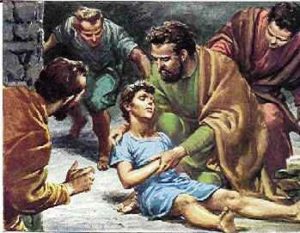
When the Christians gathered on the first day of the week, they met together in the evening. (The first day of the week was a workday, so it appears they would meet at night.) Paul is intending to leave the next day, so people are eager to hear him teach. He teaches through the night. Because the upper room where they were meeting was poorly ventilated and many lamps were burning, a young man named Eutychus falls asleep while sitting on an open window ledge and is killed as he accidentally falls from the third story to the ground. (The word for ‘boy’ or ‘young servant’ is used in verse 12 indicating that he may have been a young adolescent who worked hard all day. Fatigue at midnight in a room lacking oxygen would be understandable.) Eutychus was picked up dead. Paul went down threw himself on the boy and put his arms around him and picked him up alive! (Eutychus’ name means ‘Fortunate’!) There is no reference to Paul’s method, but no doubt, Paul had faith in the God he was speaking about. Instead of sending everyone home to get sleep before the next workday, Paul went upstairs again, worshiped the Lord with the covenant meal of the breaking of bread, and taught until daylight. Such hunger for the Word of God is a sign of revival!
Paul may have been wary of further attempts on his life while on board a ship, so we see that he prefers to walk while other team members take a boat. He eventually boards their ship at Assos, and they sail to Miletus. He was behind schedule, as he was hoping to deliver the collection to the church in Jerusalem while they were gathered for the annual Feast of Pentecost. Rather than doing a return trip to Ephesus, he saves time by calling for the church elders from Ephesus to meet him in Miletus.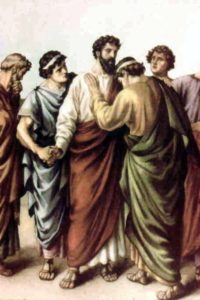
We learn so much about Paul’s ministry to the Ephesians, and Christian ministry in general from Paul’s address to the elders (Acts 20:18-35). We sense his great love for the church members, the church’s leaders and their love for him. They weep together with affectionate embraces when they part (Acts 20:36-37). The cares of the churches came upon him daily. Paul loved the church and selflessly gave himself to serve the saints.
What do we learn from Paul’s example?
- The primary importance of preaching the Word of God thoroughly. The gospel is the message of God’s grace (v.24, 32), the message of Christ and His Messianic role as King (v. 25) and is found in all of the Scriptures (v.27). This is pastoral preaching. He recognizes the full inspiration and sufficiency of the Word of God for the faith and practice of the church. He taught both publicly in larger gatherings and in conversations from house to house. (The Acts 20:20 vision). The public reading of Scripture was not to be neglected (1 Tim 4:13).
- He preached the necessity of repentance of sin and faith in the Lord Jesus Christ and His saving work for Jews and Gentiles alike. He shows that faith and repentance are inseparably connected to each other. Turning to the Living God (faith) involves turning away from our idolatrous sins and false beliefs (repentance) (Acts 20:21; 1 Thessalonians 1:9)
- We are to love the church and be sure there is loving watchcare for it with undershepherds appointed by God the Holy Spirit. They are to feed, lead and guard the flock from savage wolves (truth-distorting, disciple-attracting false teachers). WARNING is a normal part of preaching. (Acts 20:28-31)
- Sacrifice is necessary and worthwhile if it means we can fulfill our calling to testify of the gospel of God’s grace (Acts 20:24). Ministry in general is hard work. We are to be givers more than takers.
Acts 20:35 35 “In everything I showed you that by working hard in this manner you must help the weak and remember the words of the Lord Jesus, that He Himself said, ‘It is more blessed to give than to receive.'”
TODAY’S READING FROM THE BOOK OF PSALMS- PSALM 148:1-14
What a great symphony of praise this is! Let the whole heavens and the whole earth praise Him!
TODAY’S READING FROM THE BOOK OF PROVERBS- PROVERBS 18:6-7
Proverbs 18:6-7 6 A fool’s lips bring strife, And his mouth calls for blows. 7 A fool’s mouth is his ruin, And his lips are the snare of his soul.
Do your words get you into trouble? Wish you could take them back? Ask God to bridle Your tongue with the knowledge of His Word and the sanctifying agency of the Holy Spirit.
PRAY FOR THE NATIONS- The State of Haryana, India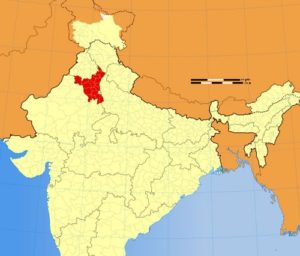
Haryana is one of India’s least evangelized states. Only 32,000 identify themselves as Christian among its 22 million people. 6,000 villages have no Christian witness. But 15 Christian training centers have work here. Pray for them to equip new workers for outreach. A significant number of Sikhs in Haryana have come into the kingdom. Pray that this number increases, and has an impact on Sikhs elsewhere. Few know Christians exist among the 1.7 million Brahmins or the 750,000 Shaikhs.
PRAYER: Lord, all creation praises You, for You alone are God. You alone are the Deliverer of those You have chosen to redeem. You are worthy of the full surrender of our lives. Help us to be like Paul and not count our lives dear to ourselves, that we might be givers rather than grabbers, lovers rather than liars, truly committed, rather than compromised. Keep us from the worthless idols of today. We know we become like what we worship. We want to become like You, through Jesus Christ, our Lord and the sanctifying work of Your Holy Spirit. Help us to finish the course well. In Jesus’ Name. Amen.
